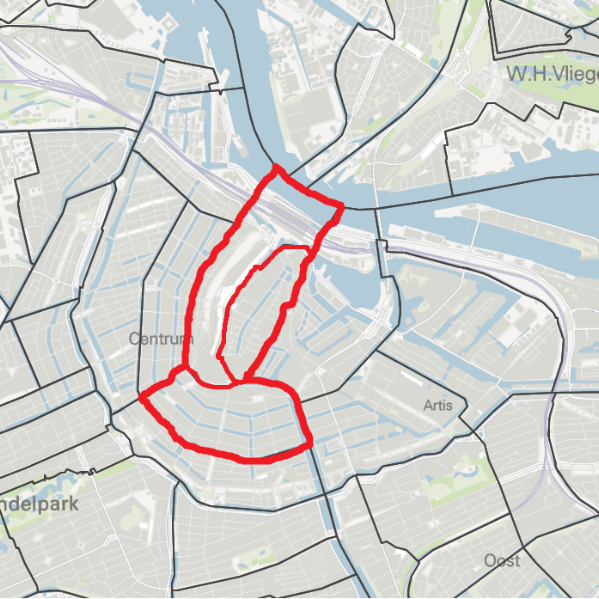The entire city is intended to be subject to a permit requirement for holiday rentals, with no permits being granted for the Burgwallen-Oude Zijde, Burgwallen-Nieuwe Zijde and Grachtengordel-Zuid districts. The first measure – the permit requirement – follows the ruling earlier this year by the Administrative Law Division of the Council of State. The second measure is independent of this and serves to reduce the pressure on the city centre. Although, ironically enough, the city centre now seems to be more likely to suffer from a lack of tourists, the Municipal Executive intends to introduce the measures as early as 1 July 2020. Below, we discuss the (legal) background and scope of the measures in more detail.
Housing Act 2014
Pursuant to Section 21 of the Dutch Housing Act 2014 (Huisvestingswet 2014), it is forbidden, briefly stated, to evade residential accommodations of its housing designation without a permit. The scope of the section is limited to residential accommodation belonging to a category of buildings designated by the Municipal Council in the Housing Regulations with a view to the preservation or composition of the housing stock and located in a district designated in the Housing Regulations.
Housing Regulations Amsterdam 2020
In its Housing Regulations Amsterdam 2020 (last amended as of 11 February 2020), the Municipal Council of Amsterdam has designated the following categories of buildings: a. all independent residential spaces with a calculation rent up to the rent-control ceiling; b. all independent residential spaces up to and including 200 rental points; c. all independent residential spaces with more than 200 rental points; and, d. all non-independent residential spaces up to 750 rental points located in the Municipality of Amsterdam. It follows from the explanatory memorandum to the regulations that “the entire housing stock, both owner-occupied and rented, is scarce in the Amsterdam metropolitan region and that the whole of Amsterdam can be designated as a scarcity area.” Taking the categories together, this means that practically all residential accommodations within the municipal boundaries have been designated as residential accommodations as referred to in the Dutch Housing Act 2014, and therefore fall within the scope of the evasion ban.
In the Housing Regulations Amsterdam 2020, the Council did formulate exceptions to this permit requirement, such as – and relevant in this case – holiday rentals. According to the regulations, no permit is required if and as long as: a. the occupant, who rents out residential accommodation, has the accommodation in question as his or her main residence and is registered at the address of this accommodation stated in the Key Register of Persons; b. holiday accommodation is provided for a maximum of thirty nights per calendar year; c. no more than four persons per night are provided with accommodation; d. the accommodation is not rented accommodation owned by a housing corporation; e. the residential accommodation is not located in an area where a ban on holiday rentals applies; and, f. the occupant who rents out the accommodation reports this use electronically to the Municipal Executive by means of a form prescribed by the Municipal Executive, each time prior to the start of the holiday rental use.
Ruling of the Administrative Law Division of the Council of State of 29 January 2020
The final condition, the reporting obligation, was at issue in the case on which the Administrative Law Division of the Council of State (highest administrative court in the Netherlands) ruled on 29 January 2020 (reference number: ECLI:NL:RVS:2020:261). For failure to comply with the reporting obligation, the Municipal Executive of Amsterdam, as the competent authority, had fined an occupant of a property that she had offered and rented through Airbnb. The Division revoked that fine. In fact, the Division ruled that the Housing Act 2014 does not provide any scope at all for municipalities to include an exception to the permit requirement in housing regulations, and may therefore not impose any conditions on it. The exception and therefore the conditions under which holiday rentals could be let were non-binding (because they were in violation of the Housing Act 2014) and therefore the municipality was not allowed to impose a fine for violating one of those conditions. However, the municipality does have the power to determine (and therefore to adopt policy) in which cases it refrains from imposing a fine, as follows from the above judgment.
Consequences of the ruling
By letter of 13 February By letter of 13 February 2020, the Municipal Executive informed the Council of the consequences of the above ruling of the Division. As holiday rentals now have to be subject to a permit requirement and the Municipality of Amsterdam does not currently have a permit system for holiday rentals, the housing regulations must be amended accordingly. It also follows from the letter that, for the time being, no fines will be imposed if the holiday rental takes place less than 30 days per year and is rented out to no more than four people. In the letter, the Municipal Executive proposes two options to rectify the 'defects':
(i) do nothing and wait until the new Dutch Letting of Residential Accommodation to Tourists (Registration and Sanctions) Act (Wet toeristische verhuur van woonruimte) has entered into force;
or (ii) introduce a permit system for holiday rentals. The Letting of Residential Accommodation to Tourists (Registration and Sanctions) Act is intended to amend the Housing Act 2014 in such a way that renting out accommodation to tourists (holiday rental) could be possible under conditions to be imposed by the municipality, without the need for a permit.
With the introduction of this Act, Amsterdam could, in fact, declare its 'old' rules – declared non-binding by the Division – to be 'binding' again. The act was scheduled to enter into force on 1 July 2020, but the Municipal Executive already doubted its feasibility in its letter of 13 February 2020. This seems justified, because the act is still being debated by the Dutch House of Representatives, and in view of the current coronavirus crisis, most legislative processes are (or will be) delayed. In its letter of 13 February 2020, the Municipal Executive therefore opted to set up a permit scheme for holiday rentals and to amend the Housing Regulations accordingly. At the same time, it announced that it would "continue to prepare district bans on holiday rentals in neighbourhoods where the quality of life is under too much pressure."
According to an announcement on the website of the Municipality of Amsterdam of 16 April 2020 (which has been copied in various media), the municipality intends to introduce a permit system as of 1 July 2020: "This means that as of 1 July in 96 districts in Amsterdam, a permit will be required to rent out residential accommodation to tourists. In the three districts where holiday rentals are forbidden, no permits will be granted." Those three districts where no holiday rental permits will be granted are the districts Burgwallen-Oude Zijde, Burgwallen-Nieuwe Zijde and the Grachtengordel-Zuid. On the basis of the announcement itself, it is not clear what the amendment of the Housing Regulations will look like. The documents can be inspected by appointment at the city desk of the Centre district (Amstel 1 - Stopera). Given the current coronavirus measures, it would have been natural to put these documents online as well, all the more so because everyone will have the opportunity to give their views on the proposal (from 17 April to 28 May 2020). However, the Amsterdam districts are shown on the online map of the Municipality of Amsterdam. Selecting the three districts where a permit for holiday rentals will no longer be granted provides the following image:

It follows from the announcement on the municipality's website that the three districts have been selected as a result of a study by Research Information and Statistics (OIS) into the tourist capacity in all 99 districts in Amsterdam. That research suggests that "there are exceptional numbers of tourists in the Burgwallen-Oude Zijde, Burgwallen-Nieuwe Zijde and the Grachtengordel-Zuid districts." And: "The study by OIS is carried out every two years, so it is possible that other prohibition districts will follow in the future."
Conclusion
Now that the city centre is empty and deserted, and it is not foreseeable when tourism can and will be revived, the measures announced as of 1 July 2020 seem surprising. But as soon as tourism gets back on track, it will undoubtedly soon be busy in the capital again. The question is to what extent the measures then contribute to relieving the pressure on the city centre, and also whether the holiday rental ban for the three districts will not result in increased pressure on the surrounding districts. Or are the three districts perhaps the beginning of an oil slick that will continue to spread (every two years)?

